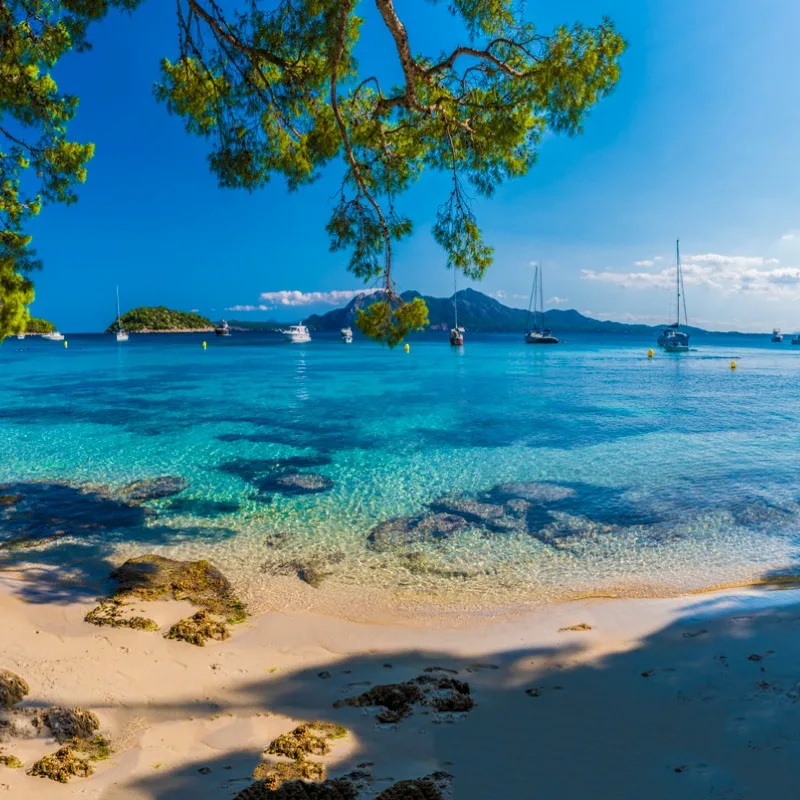Last Updated
Traveling to Spain for summer 2022? You may want to get acquainted with six local laws that could land you hefty fines of up to U$3,146, especially if you’re not well informed enough. Including, believe it or not, wearing only a bikini or going shirtless in certain locations.

While these rules do not apply to the whole of the Kingdom of Spain, as each autonomous region can establish its own set of rules, they must be observed in a number of massively popular areas, including the Catalan capital, Barcelona, and resort towns in Ibiza.
As these are specific to select regions, tourists should always check local laws ahead of traveling. And trust us, Spanish police is keeping a close eye on beachgoers and they have not hesitated to hand crippling fines, however minor the transgression is.
Here are 6 local laws in different regions of Spain you should be aware of ahead of jetting off this summer:

No Wearing Bikinis Or Taking Shirts Off On The Streets
In the Eastern reaches of the country, particularly the Catalan-speaking cities of Barcelona and Palma de Mallorca, travelers have been famously fined U$266 for wearing bikinis or going topless outside beaches. While this has been happening for years, it was not until recently that this law was again brought to the attention of holidaymakers.
After all, Spain remained mostly sealed off to a majority of tourists for the best part of two years, reopening to unvaccinated Americans only recently. To put it simply, walking in swimwear in most of Barcelona and Palma is strictly forbidden, even on seafront promenades and adjacent streets.
When visiting any of these locations and staying by the ocean, make sure you ask your hotel concierge about any laws concerning the zone you’re in, and always bring an extra pair of shirts when going out, especially when planning to sunbathe or go for a swim.

Alcohol Limits
In the Balearic Islands of Spain, the resort hotspots of San Antoni de Portmany in Ibiza, Mallorca’s Magaluf, and the Palma Beach all have limits on open bar offers and the sale of alcohol between 9:30 pm and 8 am. Those who travel on all-inclusive deals are also only allowed six drinks per day as part of their package, three during lunchtime, and three over dinner.
Due to the nighttime drink ban, travelers are essentially barred from buying alcohol from vending machines or self-service alcohol dispensers. On top of that, pub crawls and party boat trips have been drastically curtailed, with those caught participating in any such non-authorized excursions risking huge fines.

Nudity At Non-Nudist Beaches Is Strictly Forbidden
Even though Spain has a liberal Mediterranean culture, and countless nudist beaches to go with it, assuming that nudity on beaches is all around Spain can land you some of the most shocking fines yet. By swimming naked in non-nudist beaches, you could lose up to USD $800.30 of hard-earned vacation money.
Salobrena may be off-limits, but dedicated naturists can still enjoy other famous nudist beaches hassle-free, such as the crystal clear water stretch of Platja Es Cavallet, in Ibiza, or Cala de Home Mort, in Sitges. Tourists can find more information on natural areas by visiting local tourist information centers.

Shampoo And Soap Are Not Allowed On Beaches
More surprisingly, tourists can even be given fines for using shampoo, hair conditioner, hair treatment, or other similar products on all Spanish beaches. When caught, they can expect to pay up to U$779,97, as the chemicals present in these products are considered harmful to marine life.
Applying soap and then bathing in the ocean is equally illegal, although sunscreen and other protective measures that do not pose a risk to the environment are allowed. If in doubt, simply refrain from applying any skin cream that is not strictly health-related, such as those used exclusively for sun protection.

Sleeping On The Beach Is Illegal
Yes, you read that right. In some regions of Spain, such as the sunny port city of Valencia, visitors have been fined for sleeping on the beach after bathing hours. While napping during a beach session is not a problem, staying after dark and camping beneath the stars can result in a whopping $1,560,71 fine.
Luckily for ocean lovers and those who would like to spend as much time as possible at the beach, visiting hours during summer are usually longer as it is light outside, and still quite warm, until 9:15 pm. Regardless of sunshine hours, travelers are again urged to double-check local beach laws to avoid unpleasant encounters with law enforcers.

Barbecuing On Beaches Is Illegal
Maybe the heftiest one on this list, tourists can be hit with a USD $3,146 fine for barbecuing on the beach in several parts of Spain. In Salobrena, for instance, tourists must ask for permission from local authorities to hold a beach barbecue, and there are no guarantees they will be allowed to.
The fine for illegal barbecuing is noticeably much higher than those for using shampoo on beaches or even swimming naked in non-naturist areas. Unlike other laws listed above, the barbecue curb is overseen by municipal entities, as opposed to state or regional governments, making them even trickier to navigate.

Bottom Line
Spain is the go-to destination for sunny breaks in Europe. Boasting miles of sandy coastline and some of the best spots in the Mediterranean, it is a preferred summer vacation for Americans, Canadians, and Brits, who flock to its shores in their thousands every year to enjoy relaxed vacations at the beach.
This summer, Americans will be able to fly non-stop to Palma de Mallorca, one of the destinations mentioned above, as part of United Airlines’ largest-ever Transatlantic expansion. However, as there are varying rules in place, vacationers are advised to familiarize themselves with local laws.
After all, a single misstep can easily ruin an entire vacation.
Read More:
Travel Insurance That Covers Covid-19 For 2022
Spain And Italy Will Not Be Following EU In Removing Masks On Flights This Week
Travelers May Need Proof of €100 Spending Money Per Day In Spain And France
Top Trending Vacation Destinations Revealed (With Entry Rules)
7 Budget Friendly Beach Destinations In Europe To Visit This Summer
Read More:
Top 5 Travel Insurance Plans Starting At $10 Per Week
How To Easily Earn Points For Free Travel
↓ Join Our Community ↓
The Travel Off Path Community FB group has all the latest reopening news, conversations, and Q&A’s happening daily!

SUBSCRIBE TO OUR LATEST POSTS
Enter your email address to subscribe to Travel Off Path’s latest breaking travel news, straight to your inbox.
This article originally appeared on TravelOffPath.com

Stephen White
Thursday 26th of May 2022
Most of these rules seem exceedingly reasonable. My wife and I just came back from Spain 3 days ago, and there are lots of unruly tourists (particularly football fans in Seville) who think nothing of having drunken fist fights in the streets, setting fire to apartments, throwing chairs at outside restaurants, and similar antisocial behavior. Asking people not to walk around Barcelona half-naked (seriously??) doesn't seem that difficult to me.
Christian
Thursday 26th of May 2022
@Stephen White, the problem I have is not as much the rules as the fines. If somebody goes to the beach on sunset and accidentally falls asleep passed the hour, the corrupt police could take advantage and collect money.